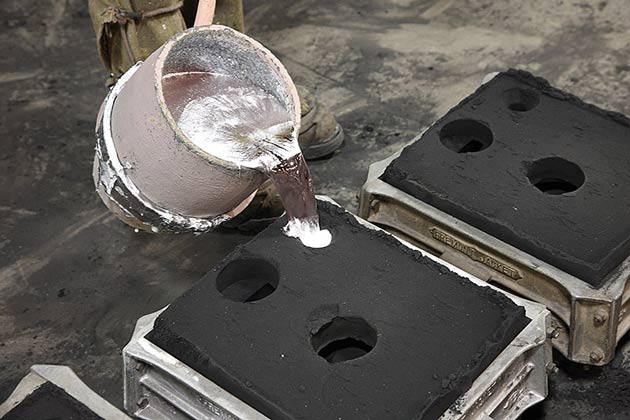The Ultimate Guide To Stahl Specialty Company
The Ultimate Guide To Stahl Specialty Company
Blog Article
The 15-Second Trick For Stahl Specialty Company
Table of ContentsStahl Specialty Company - The FactsGetting My Stahl Specialty Company To WorkEverything about Stahl Specialty CompanySome Known Details About Stahl Specialty Company The Ultimate Guide To Stahl Specialty Company
The refined distinction depends on the chemical web content. Chemical Comparison of Cast Light weight aluminum Alloys Silicon advertises castability by reducing the alloy's melting temperature and enhancing fluidness throughout spreading. It plays a crucial function in enabling detailed mold and mildews to be loaded accurately. Furthermore, silicon adds to the alloy's toughness and put on resistance, making it beneficial in applications where resilience is critical, such as automotive parts and engine components.It additionally improves the machinability of the alloy, making it simpler to process right into finished items. This way, iron contributes to the total workability of aluminum alloys. Copper raises electric conductivity, making it advantageous in electric applications. It likewise boosts rust resistance and includes in the alloy's total strength.
Manganese contributes to the toughness of aluminum alloys and boosts workability. It is typically used in wrought light weight aluminum products like sheets, extrusions, and accounts. The visibility of manganese aids in the alloy's formability and resistance to fracturing during construction processes. Magnesium is a lightweight component that offers toughness and impact resistance to light weight aluminum alloys.
It enables the manufacturing of lightweight elements with superb mechanical properties. Zinc enhances the castability of aluminum alloys and helps manage the solidification procedure throughout spreading. It boosts the alloy's strength and firmness. It is commonly located in applications where elaborate shapes and fine information are essential, such as attractive castings and certain automobile parts.
Unknown Facts About Stahl Specialty Company
Because aluminum-silicon alloys have good spreading homes, high gas residential properties, straightforward procedures, and superb rust resistance, aluminum-silicon alloys are most typically used in the die-casting industry in your home and abroad. At the exact same time, aluminum-silicon alloys are also relatively very early and commonly recognized alloys created and utilized in die-casting. After continuous study and enhancement, a lot of the current global mainstream aluminum-silicon alloys have been completed and are nothing greater than A356, A360, A380, ADC12, B390, and A413.
The main thermal conductivity, tensile toughness, yield strength, and prolongation differ. Select appropriate resources according to the efficiency of the target product generated. Among the above alloys, A356 has the highest possible thermal conductivity, and A380 and ADC12 have the most affordable. The tensile limit is the contrary. A360 has the most effective return strength and the greatest elongation price.

What Does Stahl Specialty Company Do?
In accuracy casting, 6063 is appropriate for applications where elaborate geometries and high-quality surface area coatings are vital. Examples consist of telecommunication rooms, where the alloy's exceptional formability permits smooth and aesthetically pleasing styles while maintaining architectural stability. Likewise, in the Illumination Solutions industry, precision-cast 6063 components create classy and effective lights fixtures that need detailed shapes and great thermal efficiency.
(https://stahlspecialc.creator-spring.com)
It leads to a better surface area finish and much better corrosion resistance in A360. Additionally, the A360 displays exceptional elongation, making it perfect for complicated go to website and thin-walled components. In precision casting applications, A360 is fit for industries such as Consumer Electronic Devices, Telecommunication, and Power Devices. aluminum foundry. Its improved fluidness permits elaborate, high-precision elements like smart device casings and communication device real estates.

In precision casting, light weight aluminum 413 beams in the Customer Electronics and Power Tools markets. This alloy's premium corrosion resistance makes it an outstanding option for exterior applications, making certain long-lasting, resilient products in the pointed out markets.
Getting My Stahl Specialty Company To Work
The aluminum alloy you pick will significantly impact both the spreading process and the properties of the last product. Due to the fact that of this, you need to make your decision meticulously and take an educated method.
Identifying the most appropriate light weight aluminum alloy for your application will indicate considering a vast array of attributes. The first classification addresses alloy qualities that influence the manufacturing process.
The alloy you pick for die spreading straight influences several elements of the casting process, like just how very easy the alloy is to deal with and if it is prone to casting problems. Warm fracturing, also called solidification breaking, is a normal die spreading issue for light weight aluminum alloys that can result in internal or surface-level tears or cracks.
How Stahl Specialty Company can Save You Time, Stress, and Money.
Certain light weight aluminum alloys are extra at risk to warm splitting than others, and your selection should consider this. Another usual defect discovered in the die casting of aluminum is die soldering, which is when the cast sticks to the die walls and makes ejection hard. It can harm both the cast and the die, so you should seek alloys with high anti-soldering homes.
Deterioration resistance, which is already a notable feature of light weight aluminum, can vary substantially from alloy to alloy and is a necessary characteristic to take into consideration depending upon the ecological conditions your item will be subjected to. Wear resistance is one more home commonly sought in light weight aluminum products and can separate some alloys.
Report this page